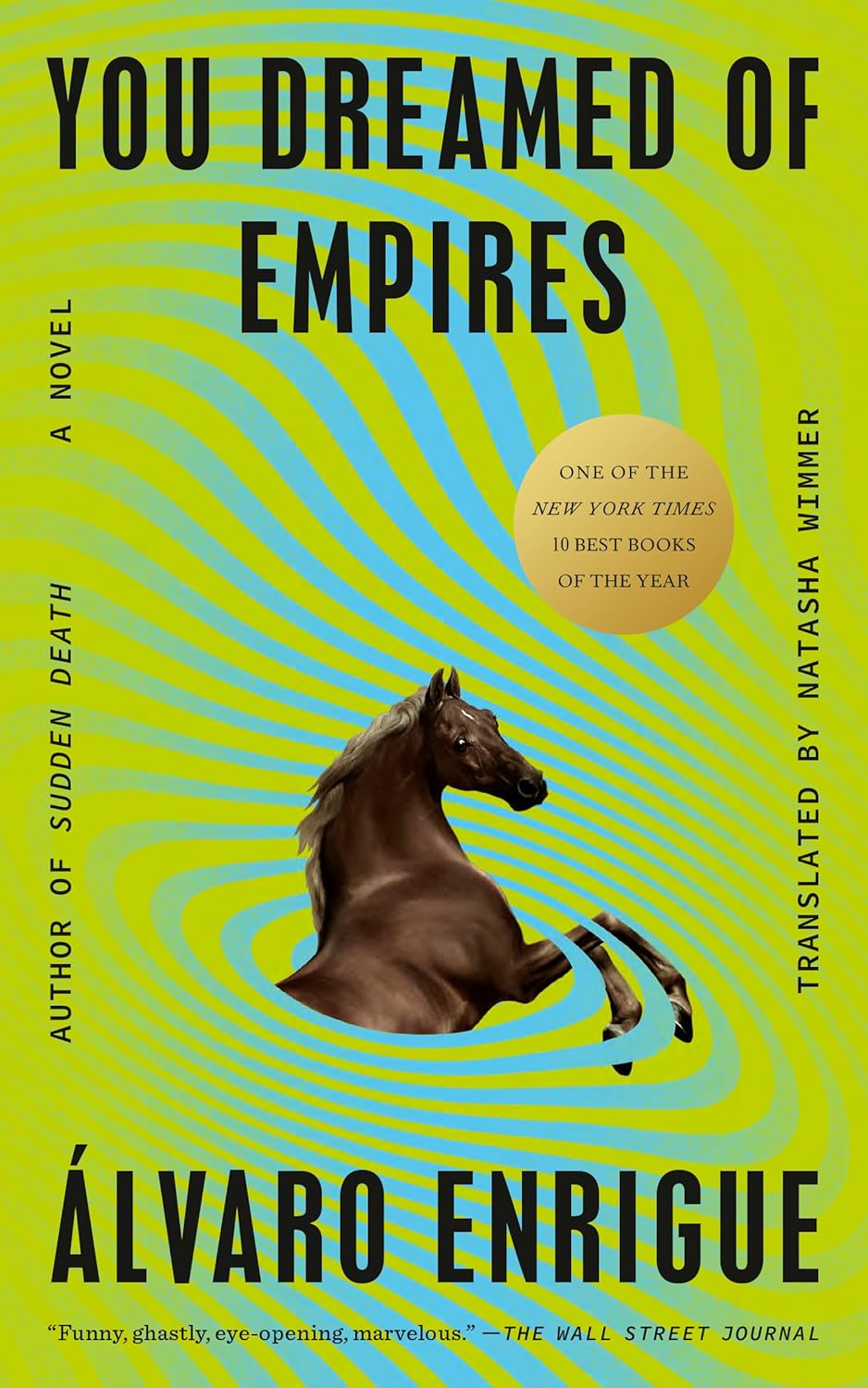
You Dreamed of Empires
Álvaro Enrigue’s You Dreamed of Empires reimagines the fateful 1519 meeting between Hernán Cortés and Aztec emperor Moctezuma in the grand city of Tenochtitlan. Blending history with hallucinatory storytelling, the novel explores the clash of civilizations, the unpredictability of fate, and the distortions of historical narrative. With dark humor and rich prose, Enrigue crafts an alternative vision of conquest, power, and the dreamlike haze of empire at the brink of collapse.
Description
- You Dreamed of Empires is a bold, genre-defying reimagining of the encounter between Spanish conquistador Hernán Cortés and Aztec emperor Moctezuma in 1519. Blending historical fiction, magical realism, and dark humor, the novel subverts traditional conquest narratives by portraying the clash of civilizations as a surreal, hallucinatory struggle for power. The story unfolds through shifting perspectives—Cortés’s ambition, Moctezuma’s mysticism, and the cunning of Malinalli (La Malinche), the Indigenous translator who navigates both worlds. With dreamlike sequences, philosophical musings, and razor-sharp prose, Enrigue dismantles colonial myths, exposing the absurdity and brutality of empire-building.
FAQs
- 1. Is this book historically accurate?
- No—Enrigue deliberately distorts history, mixing facts with fantasy to critique colonial narratives. For example, Cortés's hallucinogenic vision of the future and his gruesome death at Aztec hands are fictional.
- 2. What's the significance of the "cactus-of-tongues"?
- The hallucinogenic cactus symbolizes failed communication and the illusion of understanding between cultures. It also mirrors real Indigenous rituals involving peyote or psilocybin.
- 3. Who is "La Malinche," and why is she central?
- Malinalli (La Malinche), the Indigenous translator, embodies the complexity of cultural betrayal and survival. Enrigue portrays her as neither victim nor traitor but as a pragmatic strategist.
- 4. Why does Moctezuma speak "Greek"?
- The novel uses "Xleek" (Greek) as a metaphor for untranslatable power. It mocks Cortés's belief in European superiority while highlighting language's role in domination.
- 5. What's the meaning of the recurring "ant" motif?
- The ant represents silent, inevitable forces that undermine empires—a nod to Indigenous resistance and the fragility of colonial projects.
Quotes
- On Power:
- "The ant may not talk, but in the end he always shows the way."
- —Moctezuma’s warning about the unseen forces that topple empires.
- On Conquest:
- "Cortés dreamed of gold, but the dream dreamed of Cortés."
- —A meta-commentary on the futility of colonial ambition.
- On Cultural Collision:
- "They call him El Malinche because the person they’re really talking to is Malintzin—not the captain."
- —Highlighting the erasure of Indigenous agency in history.
- On Hallucination:
- "Dream now, conqueror. See what your victory will cost."
- —Moctezuma’s chilling invitation to Cortés before his psychedelic vision.
- On History:
- "Empires are just dreams that outlive their dreamers."
- —The novel’s central thesis, echoing Calderón’s Life Is a Dream.
- I. Before the Nap 2,692 Words
- II. Moctezuma’s Nap 3,151 Words
- III After the Nap 3,503 Words
- Cortés’s Dream 3,032 Words
Quotes
On Power:
— Unknown
"The ant may not talk, but in the end he always shows the way."
— Unknown
— Moctezuma’s warning about the unseen forces that topple empires.
On Conquest:
— Unknown
"Cortés dreamed of gold, but the dream dreamed of Cortés."
— Unknown
— A meta-commentary on the futility of colonial ambition.
On Cultural Collision:
— Unknown
"They call him El Malinche because the person they’re really talking to is Malintzin
— not the captain."
— Highlighting the erasure of Indigenous agency in history.
On Hallucination:
— Unknown
"Dream now, conqueror. See what your victory will cost."
— Unknown
— Moctezuma’s chilling invitation to Cortés before his psychedelic vision.
On History:
— Unknown
"Empires are just dreams that outlive their dreamers."
— Unknown
— The novel’s central thesis, echoing Calderón’s Life Is a Dream.
FAQs
1. Is this book historically accurate?
No—Enrigue deliberately distorts history, mixing facts with fantasy to critique colonial narratives. For example, Cortés's hallucinogenic vision of the future and his gruesome death at Aztec hands are fictional.
2. What's the significance of the "cactus-of-tongues"?
The hallucinogenic cactus symbolizes failed communication and the illusion of understanding between cultures. It also mirrors real Indigenous rituals involving peyote or psilocybin.
3. Who is "La Malinche," and why is she central?
Malinalli (La Malinche), the Indigenous translator, embodies the complexity of cultural betrayal and survival. Enrigue portrays her as neither victim nor traitor but as a pragmatic strategist.
4. Why does Moctezuma speak "Greek"?
The novel uses "Xleek" (Greek) as a metaphor for untranslatable power. It mocks Cortés's belief in European superiority while highlighting language's role in domination.
5. What's the meaning of the recurring "ant" motif?
The ant represents silent, inevitable forces that undermine empires—a nod to Indigenous resistance and the fragility of colonial projects.

